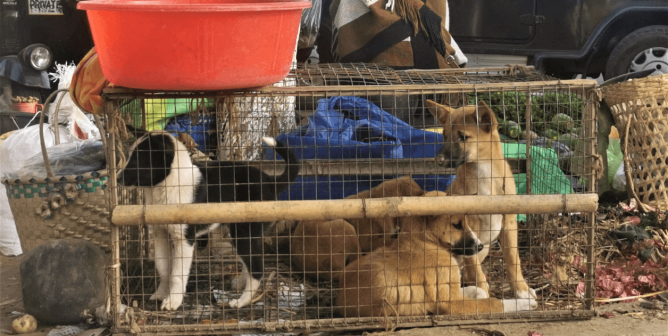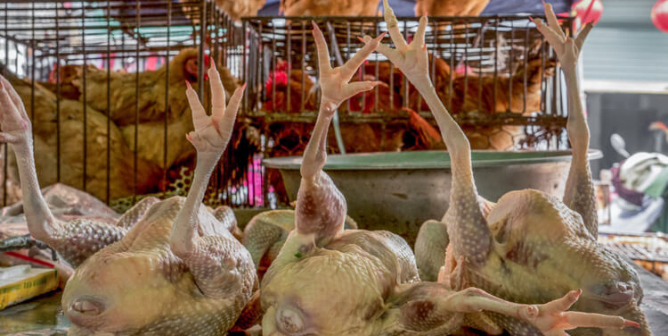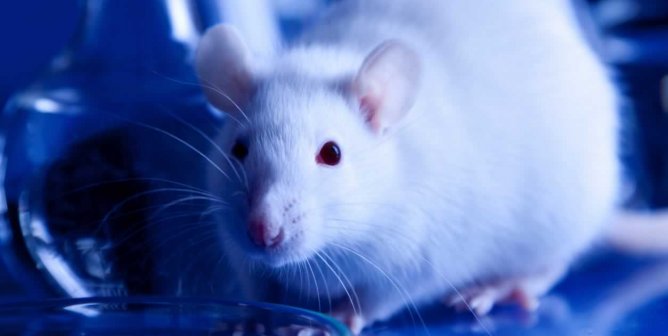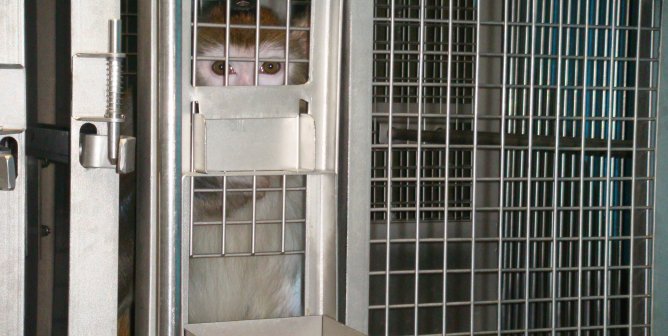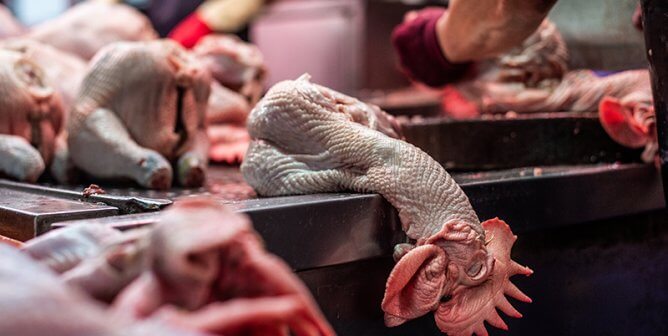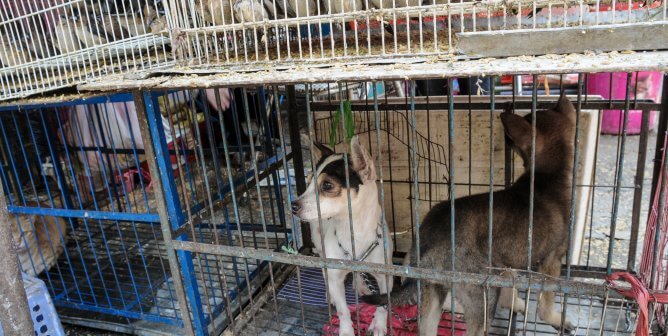Animal Agriculture, The Climate Crisis, and Disease
Animal agriculture harms human health in more ways than one: Cramped, filthy conditions on today’s intensive farms can lead to outbreaks of zoonotic diseases (which can spread from animals to humans). Overuse of antibiotics in animals causes antibiotic resistance in animals and humans. And consuming animal-derived foods weakens our immune systems and metabolic health. In addition, animal agriculture is a major contributor to the climate crisis, which is increasing the prevalence of both infectious and chronic diseases.
How Does Animal Agriculture Cause the Climate Crisis?
The climate crisis is primarily caused by an increase in levels of greenhouse gases in the atmosphere as a result of anthropogenic (human-caused) activities. One such activity that is a leading driver of the climate crisis is animal agriculture—the practice of breeding and raising animals for food or clothing—which, by some estimates, is responsible for more greenhouse-gas emissions than the entire transportation sector combined.1 That’s because it takes vast resources to raise cows, pigs, chickens, sheep, and other animals—from land, water, and feed to the electricity needed to power farms.2 Furthermore, many commonly farmed animals, such as cows, goats, and sheep, are ruminant. Their stomachs have four chambers, including the rumen, which ferments their food so that nutrients can be extracted. Owing to their specialized digestive systems, ruminant animals release methane and nitrous oxide every time they pass gas or feces. This is a serious issue, considering that globally, there are at least 1.4 billion cows, and that both methane and nitrous oxide have a much higher Global Warming Potential than carbon dioxide (CO2), meaning that they capture more heat in the atmosphere.3 Animal agriculture is the single largest source of methane emissions in the U.S.,4 and methane is 80 times more powerful than CO2 at warming the Earth over 20 years.5 Nitrous oxide is even more potent—it is 300 times more warming than CO2.6
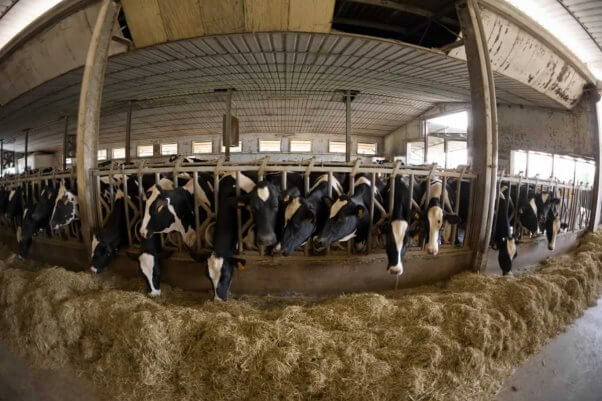
As a result, even locally sourced or organic animal-derived foods are more taxing on the environment than vegan foods. An analysis found that the production of 1 kilogram of the beef that has the smallest carbon footprint emits at least 9 kilograms of CO2 equivalent (CO2e). (Producing 1 kilogram of beef with the largest footprint results in more than 105 kilograms of CO2e.) In comparison, producing 1 kilogram of tofu contributes between 1 and 3.5 kilograms of CO2e.7 Animal-derived foods, in general, are responsible for between 10 and 50 times the greenhouse-gas emissions that plant-based ones are.8 Regardless of whether you compare the carbon footprint of foods by weight, protein content, or calories, the findings are always the same: Animal-based foods have a much larger footprint than their plant-based equivalents. As a result, expert groups like the United Nations Intergovernmental Panel on Climate Change (IPCC) are warning the public that meat and dairy consumption must be drastically reduced in order to mitigate the disastrous effects of the climate crisis on our planet and our health.9
How Will the Climate Crisis Increase the Risk of Disease?
The climate crisis poses various health risks, including an increase in both chronic and infectious diseases. Rising temperatures and extreme heat can be dangerous for people who are elderly or immunocompromised and will increase the rate of heat-related illness and death, including from cardiovascular failure. We have already witnessed this phenomenon during heat waves in Europe, where every year, vulnerable individuals suffer from heat-induced illnesses. In summer 2003, record-high temperatures in Europe resulted in the deaths of at least 30,000 people.10 The climate crisis is also increasing the prevalence of allergens, both because of increased air pollution and because higher temperatures and CO2 levels can cause shifts in flowering time and pollen initiation.11 This can trigger respiratory allergies, asthma, and cardiovascular disease.
Water quality is also negatively affected by the climate crisis. Increased rainfall promotes the transport and dissemination of pathogens in water sources, and higher temperatures optimize their growth and survival.12 This can result in outbreaks of potentially lethal waterborne diseases like cholera, cryptosporidiosis, campylobacter, and leptospirosis.
Warmer temperatures also promote the spread of vector-borne diseases—those carried by animals such as mosquitos, fleas, and ticks, who are generally most active when temperatures are high and are dormant during the winter. As periods of warm weather get longer and historically cold regions warm up, the ecology of vectors is changing and their breeding grounds and lifespans are increasing—especially in the case of mosquitos.13 This is causing a rise in vector-borne diseases like malaria, dengue, encephalitis, hantavirus, Rift Valley fever, Lyme disease, chikungunya, and West Nile virus.14 Experts have also observed that in Africa, climate change–fueled food insecurity is leading many people to sustain themselves by eating bush meat. Often, this comes from monkeys or bats, who commonly carry vector-borne diseases such as Ebola, which can spread to humans who consume the flesh of a sick animal.15
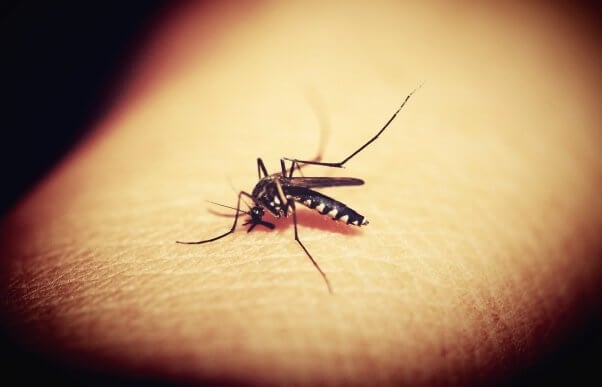
These are just some of the ways animal agriculture and the resulting climate crisis can harm human health and exacerbate the risk of pandemics like COVID-19. The impact of these health hazards will only continue to grow as long as animal agriculture keeps fueling climate change. Fortunately, we can all take simple steps to protect our health and our planet.
What You Can Do to Reduce Your Carbon Footprint
The COVID-19 pandemic has shown that when each and every one of us changes our behavior, we can save lives—and the same applies to the health risks posed by the climate crisis. We all have a responsibility to take action to reduce our carbon footprints, and the best way to do that is by ending our support of animal agriculture and going vegan. Like social distancing during a pandemic, going vegan should be viewed not as a personal choice but as part of our collective responsibility to protect our health, the planet, and animals.
References
1United Nations, “Rearing Cattle Produces More Greenhouse Gases Than Driving Cars, UN Report Warns,” UN News, 29 Nov. 2006.
2Marco Springmann, et al., “Options for Keeping the Food System Within Environmental Limits,” Nature, 562.7728 (2018): 519–525.
3Food and Agriculture Organization, “Livestock—Cattle,” 2010.
4United States Environmental Protection Agency (U.S. EPA), “Greenhouse Gas Emissions,” 28 May 2020.
5Alejandra Borunda, “Methane, Explained,” National Geographic, 23 Jan. 2019.
6U.S. EPA, “Overview of Greenhouse Gases: Nitrous Oxide Emissions,” 28 May 2020.
7Hannah Ritchie, “Less Meat Is Nearly Always Better Than Sustainable Meat, to Reduce Your Carbon Footprint,” Our World in Data, 4 Feb. 2020.
8Akshat Rathi, “Banish ‘Eat Local’ From Your Environmental Playbook,” Bloomberg Green, 4 Feb. 2020.
9IPCC, “Climate Change and Land: An IPCC Special Report on Climate Change, Desertification, Land Degradation, Sustainable Land Management, Food Security, and Greenhouse Gas Fluxes in Terrestrial Ecosystems,” 2019.
10Umair Irfan, “113 Degrees in France: Why Europe Is So Vulnerable to Extreme Heat,” Vox, 28 June 2019.
11Centers for Disease Control and Prevention (CDC), “Climate and Health: Allergens,” 18 June 2019.
12A.J. McMichael, et al., “Climate Change and Human Health: Risk and Responses,” World Health Organization, 2003.
13Chufei Tang, et al., “Elevated Atmospheric CO2 Promoted Speciation in Mosquitoes (Diptera, Culicidae),” Communications Biology, 1 (2018): 182.
14CDC, “Climate and Health: Climate Effects on Health,” 20 July 2020.
15Renee Cho, “How Climate Change Is Exacerbating the Spread of Disease,” Earth Institute, Columbia University, 4 Sep. 2014.

